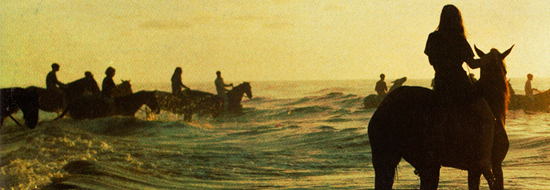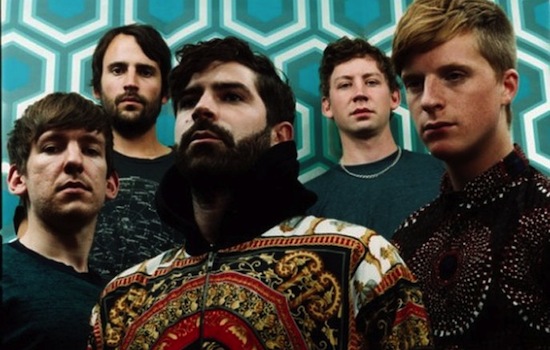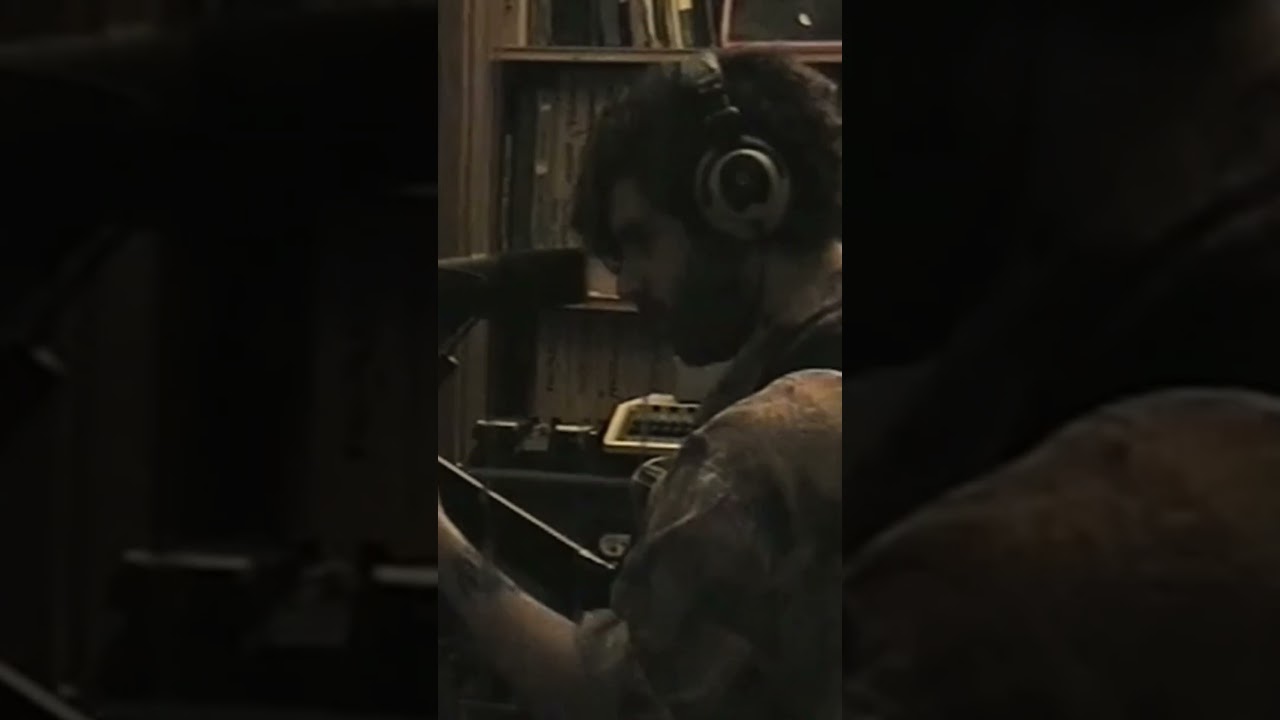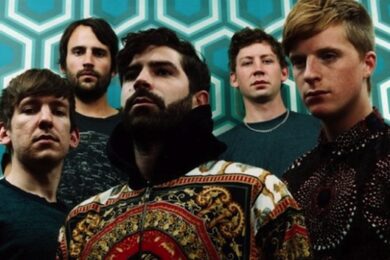The Woronora River, Sydney
We went to to the River with Jono Ma. We’d been trying out some early demos in the studio, but it wasn’t happening so we left. We set up microphones outside, Ma set up his laptop on a wooden table and we recorded into the night. We had insects buzzing at us, golden orb spiders building webs around us, it was hot and sticky and you could jump into the river. Jimmy was swimming on the other side of the river, and could hear the reverberations of some of the stuff we were working on. Some of it sounded great in that environment, other tracks didn’t, and the tracks that didn’t sound good in that environment did end up being the ones that got dropped by the wayside. They were too tethered to a grey place. That experience really informed what was to come, and getting vegetation into the studio, stuff like that.
Listening To Can In The Nevada Desert
We got baked out of our gourds in this van and were driving across the desert for 18 hours over two days. After two days we got to Vegas, and it was like this polyp sticking out of the desert. The purity and abandon of listening to Tago Mago and whizzing in all senses of the world, and then getting to this manmade, modern neon fungus… it’s so unbelievably kitsch and garish, and everything that we want to do is not that, it’s un-Vegas.
London
I’m really glad we recorded Holy Fire in London. I feel like in some subconscious way we’ve been trying to run away from the fact that we’re a British band, whereas we should be proud of that. It’s like you’ve been at a party for a little while, in the corner feeling awkward and feeling hostile because you feel cornered, but now we feel more at ease, that we’ve got something in common with these people. We did used to react against British music, not in a conscious way. I didn’t grow up with Zeppelin or the Stones as part of my lifeblood, but definitely some of the other boys grew up in British households where British Rock Music was something to be proud of. As a band we felt uncomfortable, and we were looking to American bands and American aesthetics. But now I’ve got a lot of love for London, and there’s good stuff in Britain, dance music is so much a part of the British fabric, and so much experimental music as well. It felt nice to satisfy wanting to make a record in London with two very British producers.
Flood & Moulder’s Assault & Battery Studios, London
I think what we did with the space had an impact. You’ve got no limitations. We had four separate rooms working in tandem, Edwyn had his own chamber where he had an Ableton rig, Flood had his Mr Weird lab where he would tinker and explore this ARP sequencer, then we had the control room and the live room. On a prosaic level you could get a lot done, and if something wasn’t working you could change course very quickly by moving into a different room. We brought in vegetation and greenery, and had huge candles, and then we knew we had these bones up on the roof stinking and rotting that we were excited about trying out [as drums], it just felt like this place where things were decaying and growing at the same time. As the album was being built up from scratch, you had things growing around you. It was good to be able to externally create what we were thinking about in our brains. We were thinking about voodoo, swampy things. I don’t know how much of it has permeated the record, but it’s as much our imagination of it – it’s not like we actually went to the Bayou or we went to Haiti, it’s our translation of those ideas into that space in North London.
The Music Of The American South
There was the blues like Howlin’ Wolf, getting into the lineage of that and following back to the Alan Lomax, and his recording of prison chain gangs. There’s one collection called Murderous Home that I got pretty obsessed by a few years ago. It’s lingered with me. It’s not one of those obsessions that you exhaust and move on, it’s entered into the structure of the way I appreciate and think about music. It strips all the fat and the flesh of so much music away to just these ghostly voices and the sound of pickaxes on train sleepers and rocks. Dave Sitek once said to us that you can boil tracks down to a voice and a kick drum, the kick drum is the heartbeat of the song. I didn’t really understand what he was talking about and then I started listening to these Alan Lomax recordings. There’s a power in the singing, from the point of view of the convicted man who has no opportunity for parole, and singing is the singular pleasure in his day. When you think about that, and contrast it with the musical world that you’re in, it provides a higher inspiration. Those recordings are still so powerful after 60 or 70 years, while the current temptation is to be able to micro-engineer every kick drum and create this perfect but lifeless record. It’s not that we were there with pickaxes, that would desecrate that memory, but the spirit of just live takes, capturing the honest moment to tape and not perfecting or dehumanising, and allowing it just to be the core elements of the vocal and the rhythm, that was the thrust of what we were trying to do.
Detroit
We went to Detroit and it affected me like no other place has before. We played a show and I went outside. I saw these blue collar workers who you could imagine 15 years ago working as these honest Americans, the clothes and everything was the same, and the bone structure was there, but everything had obviously been collapsed in by crystal meth. Opposite the venue were these tenement blocks where most of the windows were smashed out and there’d be lights flickering inside, and it was just freakish, it was dystopian. It was the embodiment of the fall of the Empire. There was a guy who had clearly had previous glory, it sounded like he was one of those high school marching snare drummers. He had two bins, his eyes were writhing, he had no teeth, but he was playing incredible rudiments on these two bins. I smoked a joint with this guy, I shared a moment with him, and afterwards he just went off into these serpentine, burned-out tenements.
Karpathos, Greece

I went during the break in the middle of Holy Fire for two weeks to write lyrics, and get to be in that environment again. After having been in Willesden solidly for two months doing twelve, fourteen hour days, in a box, to be able to be out on a mountaintop with the wind was good. I had been worried about the lyrics, they weren’t fully done. Being in Greece is like a sanctuary away from the pernicious and constant distractions that are here in the city, and being plugged into the 21st Century. There, wi-fi is scarce, TV is just these fake tear Greek melodramas, and you’re not in touch with the current flux of culture. Having that space and the natural landscape and a slower rhythm is perfect to pull you out. At the time I was feeling like I had one of those cartoon Roadrunner anvils over my head, and getting to get away from it I felt free again, and I had a renewed appetite without any imminent pressure to write lyrics. Greece had a massive recharging impact. It reframes things. I’ve got a duel identity. I start to get lost and tie myself in knots when I’ve been here [in the UK] too long, and I forget that there’s this whole other thing that I can plug into, this archaic backbone that’s I’m part of.
In that is this tradition of music which is as pure as it gets, and also the actual physical environment which is pure. It’s always been massively inspiring to me, the landscape there, because it’s shale and it’s bone. It’s dry, steep escarpments and there’s something about it that just renews my energy. In the village you’re either a dancer or a singer. It’s an artistic pride for males to be able to perform. they do a type of spontaneous iambic pentameter rhyme. There’s a set tune they play on the lyre and the bagpipe, then they sit in the coffee shops and have a set tune that they start to sing over, and have dialogues with each other. You sing two lines, A and B, then it’s repeated by all the men, and then you go on. Then there are the traditional songs, some of which are Byzantine, and the imagery is all about black horses, it’s very evocative of this long gone time. It’s a time capsule this village, they still do arranged marriages. Plugging in makes me feel connected to this bloodline. My father makes instruments as well. It makes me sturdy again.
Flood’s House
When I went back we were at Flood’s house to do the last bit of the vocals and the lyrics, we weren’t in the studio so much. We had all of his children’s psychotically colourful artwork around me. It was more engaging and encouraging in a way, you had the free expression of these kids who have no criticism, no sense of censorship, it’s pure expression in crazy Crayola colours everywhere, and you look at it and think ‘maybe I should just do‘. It’s telling you to jump off the diving board.
The End Of The World, Heaven & Hell
‘Moon’ was two movements. The first bit was describing the end of the world and the destruction of your body an everything disintegrating and entropy… it’s acceptance, a beautiful type of destruction, you’re in a pacific state with no resentment or sorrow To me ‘Moon’ is like a film scene, you’re walking and everything is collapsing around you, there are birds falling out of the sky and your teeth are falling out and everything is disintegrating into slurry. At the end there’s a white light and you’re accepting, and it’s beautiful and still. Your fate is ineluctable, so you are, and you’re content with it. In other songs there’s a want for forgiveness in a lot of the tracks, or guilt or shame. There’s a power behind those emotions that there isn’t if you’re just talking about more prosaic things.




